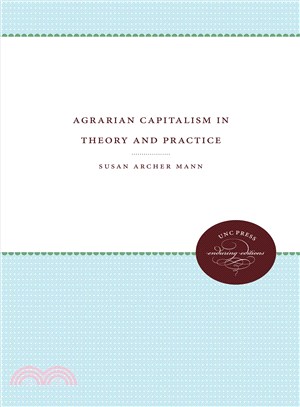Agrarian Capitalism in Theory and Practice
商品資訊
ISBN13:9780807857106
出版社:Univ of North Carolina Pr
作者:Susan Archer Mann
出版日:2010/05/01
裝訂/頁數:平裝/228頁
規格:23.5cm*15.2cm*1.9cm (高/寬/厚)
商品簡介
相關商品
商品簡介
Susan Mann focuses on a longstanding controversy in sociological theory: why has agriculture been traditionally resistant to wage labor? Capitalist develoment has been slower and more uneven in agriculture than in other spheres of production, and major parts of the rural economy remain almost preindustrial in their reliance on family labor, lack of separation between industry and household, and failure to develop a highly specialized division of labor. Emphasizing the agriculture of the American South, Mann adopts an interdisciplinary approach, drawing insights from history and economics as well as sociology.
Mann points out that most theories of agrarian capitalism -- both Marxist and non-Marxist -- ignore the implications of agriculture as a production process centered in nature, with natural features that cannot be synchronized easily into the tempos required by industrial production. She argues that various natural and technical features of agricultural production, such as the relatively lengthy production time of certain crops and the irregular labor requirements imposed by seasonal production, make some types of farming particularly risky avenues for capitalist investment.
To test this pioneering theory of natural obstacles to rural capitalist development, Mann creatively combines diverse research methodologies. Analyzing U.S. Agricultural Census data, she shows the correlations between type of agricultural commodity or crop produced, the natural and technical features of these rural commodities, and the use of wage labor. Using an historical-comparative approach, she investigates the persistence of nonwage labor in American cotton production after the Civil War. She examines why sharecropping, rather than wage labor, replaced slavery in the older cotton-producing regions of the southeastern United States. She then discusses the domestic and international factors that finally led to the demise of sharecropping and the rise of wage labor in the decades following the Great Depression.
In this historical study of the rise and demise of sharecropping, the interplay between nature, gender, race, and class is highlighted. By closely examining both natural and social obstacles to wage labor within the context of a global economy, Mann presents not only an intriguing analysis of agrarian capitalist development but also an entirely new framework for examining the social history of the American South.
A UNC Press Enduring Edition -- UNC Press Enduring Editions use the latest in digital technology to make available again books from our distinguished backlist that were previously out of print. These editions are published unaltered from the original, and are presented in affordable paperback formats, bringing readers both historical and cultural value.
Mann points out that most theories of agrarian capitalism -- both Marxist and non-Marxist -- ignore the implications of agriculture as a production process centered in nature, with natural features that cannot be synchronized easily into the tempos required by industrial production. She argues that various natural and technical features of agricultural production, such as the relatively lengthy production time of certain crops and the irregular labor requirements imposed by seasonal production, make some types of farming particularly risky avenues for capitalist investment.
To test this pioneering theory of natural obstacles to rural capitalist development, Mann creatively combines diverse research methodologies. Analyzing U.S. Agricultural Census data, she shows the correlations between type of agricultural commodity or crop produced, the natural and technical features of these rural commodities, and the use of wage labor. Using an historical-comparative approach, she investigates the persistence of nonwage labor in American cotton production after the Civil War. She examines why sharecropping, rather than wage labor, replaced slavery in the older cotton-producing regions of the southeastern United States. She then discusses the domestic and international factors that finally led to the demise of sharecropping and the rise of wage labor in the decades following the Great Depression.
In this historical study of the rise and demise of sharecropping, the interplay between nature, gender, race, and class is highlighted. By closely examining both natural and social obstacles to wage labor within the context of a global economy, Mann presents not only an intriguing analysis of agrarian capitalist development but also an entirely new framework for examining the social history of the American South.
A UNC Press Enduring Edition -- UNC Press Enduring Editions use the latest in digital technology to make available again books from our distinguished backlist that were previously out of print. These editions are published unaltered from the original, and are presented in affordable paperback formats, bringing readers both historical and cultural value.
主題書展
更多
主題書展
更多書展今日66折
您曾經瀏覽過的商品
購物須知
外文書商品之書封,為出版社提供之樣本。實際出貨商品,以出版社所提供之現有版本為主。部份書籍,因出版社供應狀況特殊,匯率將依實際狀況做調整。
無庫存之商品,在您完成訂單程序之後,將以空運的方式為你下單調貨。為了縮短等待的時間,建議您將外文書與其他商品分開下單,以獲得最快的取貨速度,平均調貨時間為1~2個月。
為了保護您的權益,「三民網路書店」提供會員七日商品鑑賞期(收到商品為起始日)。
若要辦理退貨,請在商品鑑賞期內寄回,且商品必須是全新狀態與完整包裝(商品、附件、發票、隨貨贈品等)否則恕不接受退貨。
























